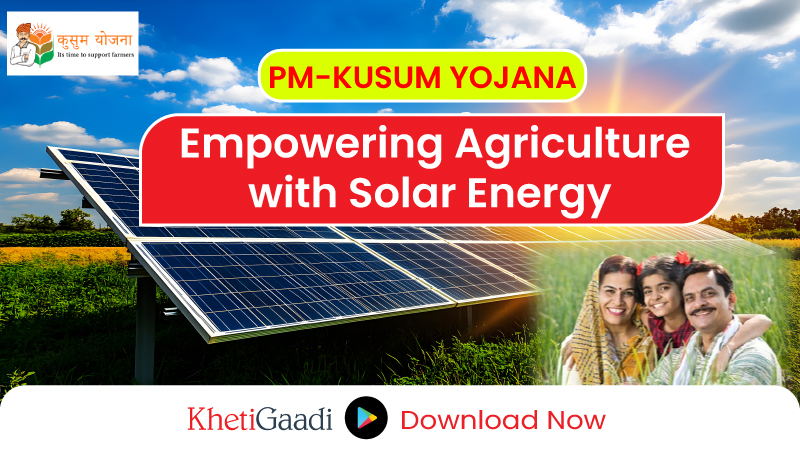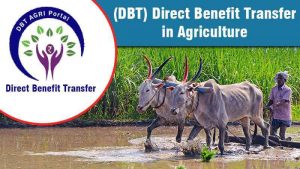India’s agricultural landscape is evolving with a growing focus on sustainability and innovation. One of the most impactful initiatives in this transformation is the Pradhan Mantri Kisan Urja Suraksha Evam Utthaan Mahabhiyan (PM-KUSUM). This scheme aims to revolutionize agricultural practices by integrating solar energy into farming operations. Let’s explore the PM-KUSUM Yojana in detail, including its objectives, benefits, eligibility criteria, application process, and real-life success stories.
Objectives of PM-KUSUM Yojana
- Launched in 2019, the PM-KUSUM Yojana seeks to achieve several critical objectives:
- Enhance Farmers’ Income: By providing an alternative source of income through solar power generation, helping farmers earn from surplus electricity sold to the grid.
- Promote Renewable Energy: Encourage the adoption of solar energy, reducing reliance on diesel and other non-renewable sources, and supporting environmental sustainability.
- Reduce Farm Expenses: Provide financial relief by replacing costly diesel-powered irrigation systems with solar-powered systems.
- Support Rural Electrification: Boost rural infrastructure and access to electricity in remote areas, promoting overall development.
Key Features of PM-KUSUM Yojana
- Solar Pumping Systems: Supports the installation of solar-powered irrigation pumps, reducing the need for diesel and offering a sustainable irrigation solution.
- Grid-Connected Solar Plants: Allows farmers to set up solar power plants with capacities ranging from 2 to 10 MW, generating electricity to be fed into the grid.
- Subsidies and Financial Support: Offers substantial financial assistance, including:
- 30% subsidy from the central government
- 30% subsidy from the state government
- 30% loan from banks
- 10% farmer contribution
- Capacity Enhancement: Encourages the installation of solar systems with varying capacities, catering to different agricultural needs and promoting widespread adoption.
- Integrated Approach: Combines solar water pumping with grid-connected solar plants, providing both irrigation support and additional income through power generation.
Eligibility Criteria for PM-KUSUM Yojana
To benefit from the PM-KUSUM Yojana, applicants must meet the following criteria:
- Type of Applicants:
- Individual farmers
- Farmer cooperatives
- Farmer Producer Organizations (FPOs)
- Agricultural cooperatives
- Land Ownership:
- Must own or lease agricultural land.
- Technical and Financial Capability:
- Must demonstrate the ability to manage and maintain the solar systems.
- Financial capacity to contribute the required 10% of the cost and handle operational expenses.
- Compliance:
- Must comply with the technical specifications and guidelines set by the scheme.
- Adherence to local regulations and requirements.
Benefits of PM-KUSUM Yojana
Economic Benefits
- Reduced Energy Costs: Solar-powered irrigation systems eliminate the need for diesel, leading to significant savings in operational costs.
- Additional Income: Farmers can earn extra income by selling surplus electricity generated from solar power plants to the grid.
- Increased Productivity: Reliable irrigation improves crop yields, supporting year-round farming and enhancing overall productivity.
Environmental Benefits
- Reduced Carbon Footprint: Solar energy is a clean, renewable source that reduces greenhouse gas emissions compared to diesel-powered systems.
- Sustainable Practices: The adoption of solar power supports sustainable agricultural practices and contributes to environmental conservation.
Social Benefits
- Rural Electrification: The scheme improves rural infrastructure and provides access to reliable electricity in remote areas, supporting rural development.
- Farmer Empowerment: By integrating solar technology, farmers gain greater control over their resources and become energy producers.
Real-Life Success Stories
Here are detailed case studies of Indian farmers who have benefitted from the PM-KUSUM Yojana:
Case Study 1: Transforming Farming in Gujarat
Location: Kutch, Gujarat
Farmer: Ramesh Patel, a cotton and groundnut farmer with 3 hectares of land
Challenges: Ramesh faced high costs associated with diesel-powered irrigation, affecting his profitability and sustainability.
Impact of PM-KUSUM Yojana: Ramesh installed a solar-powered irrigation pump through the PM-KUSUM scheme. This investment significantly reduced his fuel costs and allowed for efficient water management.
Results:
- Cost Savings: Ramesh saved approximately ₹30,000 annually in diesel expenses.
- Increased Productivity: Improved irrigation led to a 20% increase in crop yields.
- Extra Income: Selling surplus solar power generated additional income of ₹10,000 per year.
Case Study 2: Empowering Farmers in Maharashtra
Location: Nashik, Maharashtra
Farmer: Sunita Deshmukh, a grape and pomegranate farmer with 2 hectares of land
Challenges: Sunita struggled with irregular power supply and high diesel costs for irrigation.
Impact of PM-KUSUM Yojana: Sunita adopted a solar water pumping system, which provided a reliable and cost-effective solution for her irrigation needs.
Results:
- Stable Irrigation: Consistent irrigation improved the quality and yield of her crops.
- Reduced Expenses: Diesel costs were eliminated, saving her around ₹25,000 annually.
- Increased Revenue: The reliability of irrigation contributed to a 15% increase in crop production.
Case Study 3: Revitalizing Agriculture in Punjab
Location: Amritsar, Punjab
Farmer: Amarjit Singh, a wheat and rice farmer with 5 hectares of land
Challenges: Amarjit faced high costs associated with diesel pumps and inconsistent power supply affecting his farming operations.
Impact of PM-KUSUM Yojana: With the installation of a grid-connected solar power plant, Amarjit was able to generate electricity for irrigation and sell surplus power to the grid.
Results:
- Cost Reduction: Solar power replaced diesel, leading to annual savings of ₹50,000.
- Additional Income: Amarjit earned an extra ₹30,000 annually from selling surplus electricity.
- Improved Irrigation: Reliable irrigation supported better crop yields and quality.
How to Apply for PM-KUSUM Yojana
Detailed Application Process
- Verify Eligibility: Before applying, ensure that you meet the eligibility criteria for the PM-KUSUM Yojana. Eligibility includes being a farmer, farmer cooperative, or Farmer Producer Organization (FPO) with ownership or leasehold of agricultural land.
- Gather Required Documents: Prepare the necessary documents, which typically include:
- Proof of land ownership or lease agreement
- Identity proof (Aadhaar card, voter ID, etc.)
- Bank account details
- Proof of existing irrigation system (if applicable)
- Contact Local Authorities: Reach out to your state’s agriculture or energy department. They can provide detailed information on the application process, required documents, and deadlines. Contact details can usually be found on the official Ministry of New and Renewable Energy (MNRE) website.
- Submit Application: Complete and submit the application form either online or at the local office. Ensure that all details are accurate and that you provide all required documents.
- Inspection and Approval: After submission, an inspection may be conducted to verify the details of your application and ensure that your site meets the technical requirements for installation.
- Installation of Solar Systems: Once approved, the installation of solar systems will be carried out by authorized agencies. The installation process includes setting up solar panels, inverters, and necessary equipment.
- Operation and Monitoring: After installation, the solar systems will be operational. Regular monitoring and maintenance will ensure optimal performance. Farmers can start benefiting from reduced energy costs and additional income from surplus power.
- Claim Financial Assistance: The financial assistance from the scheme will be disbursed as per the agreed terms. This includes subsidies and loans, which will help offset the initial investment costs.
Data and Statistics
As of recent updates, the PM-KUSUM Yojana has seen significant uptake across India:
- Implementation Statistics: Over 30,000 solar water pumping systems have been installed under the scheme, with thousands more in various stages of planning and installation.
- Capacity Installed: The scheme aims to install 20,000 MW of solar power capacity by 2022, contributing significantly to India’s renewable energy targets.
- Farmer Beneficiaries: More than 50,000 farmers have benefited from the scheme so far, with numbers expected to grow as the scheme continues to expand.
- Economic Impact: The adoption of solar irrigation systems has led to savings of over ₹500 crore in diesel costs and has generated additional income of approximately ₹200 crore from surplus power sales.
Useful Links
Relevant Tags




